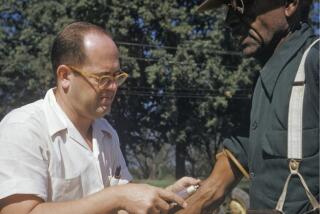Review: ‘American Denial’ on PBS’ ‘Independent Lens’
Premiering Monday as part of the PBS documentary series “Independent Lens,” Llewellyn Smith’s “American Denial” takes a social-scientific look at the cognitive dissonance that is American race relations. It’s built around and upon “An American Dilemma,” a Carnegie Foundation-funded study by Swedish sociologist Gunnar Myrdal; begun in 1938 and published in 1944, it looked at what was then tellingly called “the Negro problem” and the stubborn space between the “American creed” of liberty and justice for all and its “habits of racial domination.”
Traveling into the Deep South, Myrdal began by approaching white citizens and saying, “I’m from Sweden and we don’t have black people there. Tell me what they’re like.”
The thrust of the Myrdal’s findings, and the film’s argument -- which extends to observations by present-day researchers -- is not just that there is a difference between what we do and what we say, but also between what we think we believe and what unconsciously motivates us; and what’s more, that the contradictions that mark society are also embedded subconsciously within the individual. Since these biases are unperceived we may be inclined to argue we don’t hold them, even when tests show, in a statistically significant way, that we do. We are good liars, especially to ourselves.
Or as Myrdal said, “My general impression of human beings is that they are very confused in their minds.”
The upshot is that successive institutions have crept into place to create and maintain a permanent underclass, to the benefit of the permanent over-class, with one mistaken “truth” replacing another, as discredited notions of black physical inferiority gave way to equally suspect notions of cultural inferiority that drive arguments even within the African American community, and slavery gave way to segregation, which gave way to criminalization and incarceration.
We have not moved as far as we might like to think: Even what looks like progress -- we are now a nation with an African American president, twice elected -- can have the collateral effect of stigmatizing the less successful, who internalize the stigmas, participating, in a sense, in their own oppression. These demonstrated effects are why the Supreme Court cited Myrdal’s work in its 1954 decision on Brown v. Board of Education in support of desegregation, alongside the famous “doll study” of Kenneth and Mamie Clark, in which a preference for otherwise identical white baby dolls over black ones was demonstrated in black children as well as white.
Concurrently, “American Denial” is a sketch of Myrdal’s life, which was not without contradictions of its own: His support of women’s rights was at odds with the way he dominated his own family, or set it aside, in pursuit of his work. Letters between Myrdal and sometime co-author Alva, at home in Sweden and fed up with the disparities in their partnership, document his own, somewhat panicked self-study. (Alva, later a politician and activist, would go on to be awarded a Nobel Peace Prize, as would Ralph Bunche, Myrdal’s main researcher on “An American Dilemma,” afterward instrumental in the creation of the United Nations; Myrdal earned his own Nobel, in 1975, in for economics.)
Formally, the film can feel a bit polemical. Speakers address the camera head-on to tell you what they know in support of Myrdal’s work or subsequent studies that support it. Ungainly animated sequences feel something less than scientific. There are no dissenting or even skeptical voices heard as to methodology or conclusions -- not that I’m questioning them; I’m just saying that no one else here does.
Still, one applauds the science, the clear-eyed attempt to understand bias by taking bias out of the study of bias. That kind of rigor is essential to making policy that works, to really moving forward, and it’s worth celebrating in its own right.
Follow Robert Lloyd on Twitter @LATimesTVLloyd
More to Read
The complete guide to home viewing
Get Screen Gab for everything about the TV shows and streaming movies everyone’s talking about.
You may occasionally receive promotional content from the Los Angeles Times.







